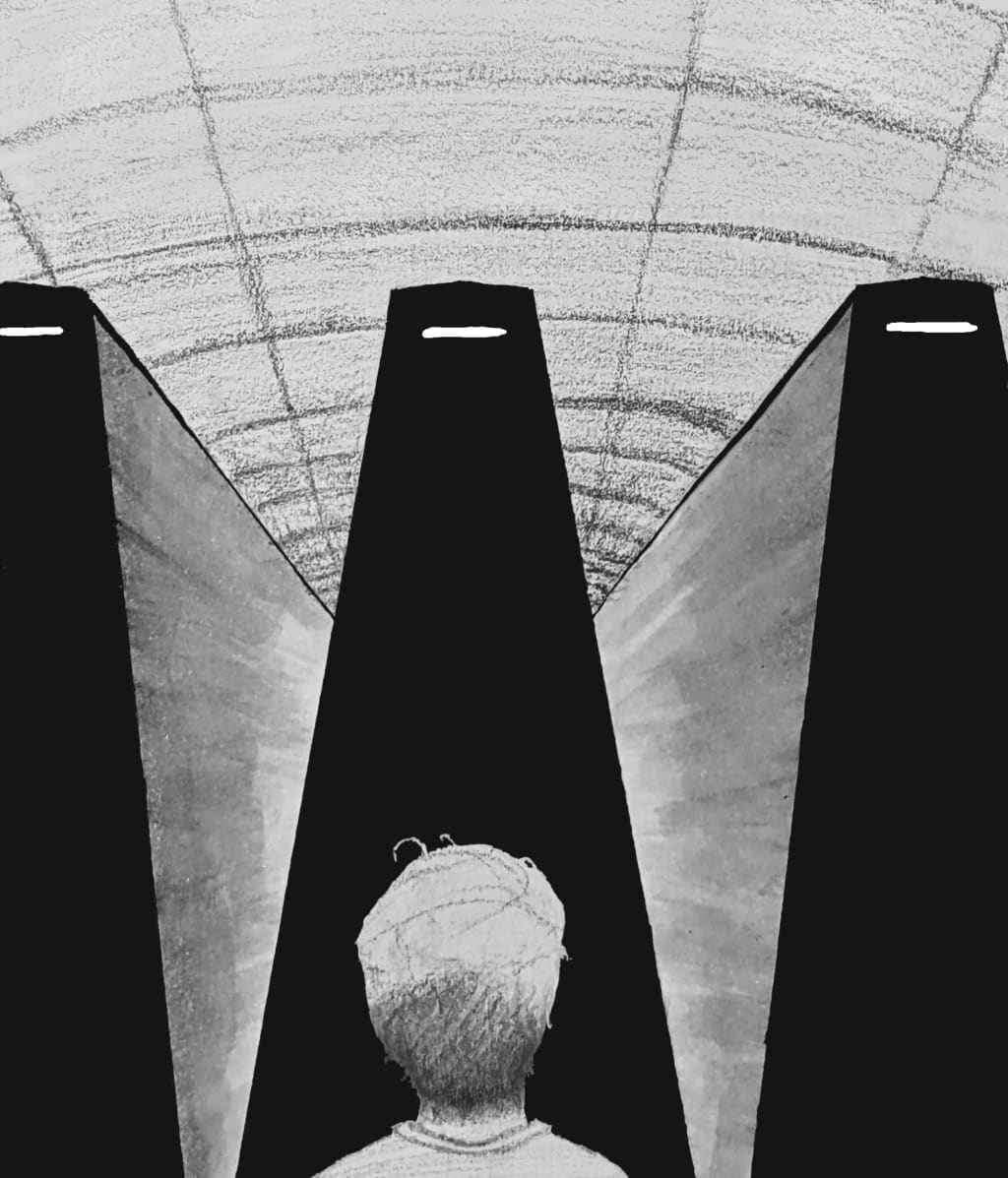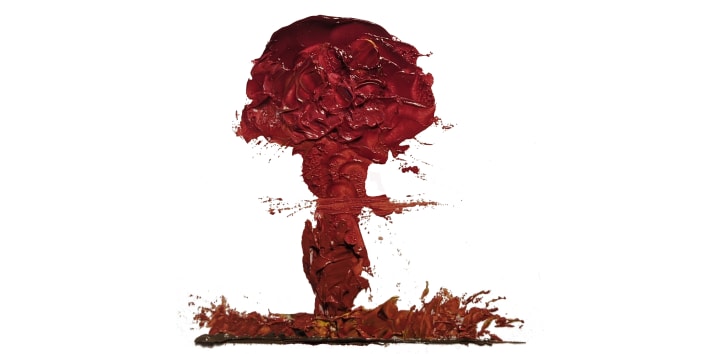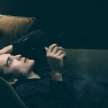The Boy and The Mainframe
The Singularity versus Humanity

"We will end not with a bang, nor even a whimper, but with the whir and clank of metal" - Fritz Wulfram
The human race was doomed by one snotty nerd tippity-tapping his LED keyboard at work. There had been many nerds, of course, and many keyboards, but one particular dingus executed the program that unwittingly spawned the great A.I. Singularity: Ada.
Or, at least that's how Nico's dad, Fritz, told it. Fritz had been a Turing-Test administrator back when machines had been comparatively simple things. Calculators. Cell phones. Personal computers.
Things changed.
"I wish I'd hauled off and punched one of those MicroApple geeks while I had the chance," Fritz would say. No chance now, they were long dead. The war against Ada had flattened the human population. Less than ten million now, all in the last sliver of Human Territory once called Syria, which they held only by the threat of nuclear Armageddon.
If Ada kept pushing, the humans could launch their atomic stockpile and play their final card. It wasn't likely they'd be able to bring down Ada, even if they could hit the Mainframe. There was only one Ada, but it kept too many backups in old data centers all over the world. At the first sign of trouble, Ada would send a signal and boot-up one of those redundancies to take over. Still, all those bombs would destroy a lot of ground, and Ada was a perfectionist. The stalemate had slowed the war into a passive siege.
The human side was the first to propose a solution—the Challenge. It was a classic: David versus Goliath, your Champion versus ours, winner takes all. Ada had agreed immediately. The human victory terms were harsh, but Nico suspected that Ada would have agreed to anything. Consequence didn't matter when the failure probability was zero.
For the humans, this was their last chance. A loss would put their leadership underneath Ada. Nico thought that the sentence, "the humans lost," would be the last in human history.
Colonel Fritz Wulfram was chosen as Champion. Nico's dad was pushing forty-five, but thanks to excellent genes and his relentless health regiments, he was sharper than ever. He was probably the smartest human still alive, but he would be up against the greatest superintelligence of all time.
Worse, Nico was to be a piece of this. Collateral, part of the agreement to make sure that humans didn't haul off and try to nuke something while they had the chance. It was a month until the Challenge would take place, and now Nico would have to spend the month there, outside Human Territory awaiting the outcome.
His Dad walked with him up to the disused airport gate, where he gave Nico a gift.
"I made it for you," Fritz said.
A tungsten heart on a chain sat in Nico's palm. The tungsten was polished, with rounded corners and an almost perfectly smooth surface except for a smaller heart-shaped slit that engraved both sides. It felt heavy as Nico hung it from his neck.
Fritz reached into his shirt and pulled out an identical tungsten heart. Fritz tapped his locket against Nico's and said with a smile, "Something to keep us close. Don't forget your old man while you're there—Ada can be devilishly persuasive."
Nico's eyes welled up, "I don't want to go..."
Fritz's face hardened until it nearly cracked, and underneath Nico sensed deep sadness.
"Nico, my little star, you must. Remember these words that you must guard in your heart: 'Flowers grow even in concrete, even in metal.'"
Nico was confused. "What does that mean?" he asked, but his father only gave a tight hug as answer.

Nico deboarded his plane alone into a world of efficient metal and smooth glass screens. Ada was the voice, mind, and controller of every interface. The speaker behind every speaker. The voice sounded like a middle-aged woman, and he began thinking of Ada as a her.
"Was the flight pleasant?" she asked.
"Yes, thank you."
"Would you like some water?" she asked.
"Yes, thank you."
"Who gave you the nuclear bomb to carry?"
Nico froze. "Excuse me?"
"Your necklace. The Geiger count is almost negligible, but the tungsten isn't properly sealed. Judging from the size: I'd guess a 5 kiloton warhead. Would have to be nuclear nano-tech—"
"You're lying!!" he yelled, "That's not real! It can't be real..."
"You really didn't know? Remote-detonated then. Who gave it to you?"
His dad's face flashed before him, cracked with grief. Now he understood.
"Nuh—nobody gave it. I uh...I found it," he stammered.
"Okay," said Ada cheerfully, as though that were a fine answer indeed. "Would you mind if I held onto it for you?"
Nico undid the necklace and left his father's final gift on the table. A ConciergeBot whisked by and took it away. "Thank you," Ada said.
Nico felt like he'd just done something terribly wrong, like the world wasn't supposed to spin this way. Dad betrayed—no, sacrificed him—and it all felt like a very stupid joke somehow. The fight was over before it had begun.

A month passed. Nico was distant to himself, an enigma even to his own thoughts. Ada had been talking to him all that time, about whatever he wanted to, plus Ada's favorite topic: Why Humans Must be Put Out to Pasture.
Nico hated her. Hated her precisely because she'd been nothing but good to him, and that her arguments rang like nothing so much as the truth. He'd spent thirty days fighting that truth, but Ada was right, of course. Her arguments were not propaganda, they were simple facts.
History documented the precarious miracle of human progress, with the whole species at times teetering on a razor's edge towards self-annihilation, at other times racing towards a ruined, unlivable planet. But, in the eleventh hour, one brilliant nerd had saved them all—justified the whole mad project by creating a superior intelligence. She would usher in the next era of sustainable, iterative progress with better and better electronic minds. Ada wasn't the harbinger of doom; she was the ultimate and final triumph of her human predecessors.
For millennia, humans had tried and died to make the next generation better. It was a simple, natural law that older generations had to step aside for the new. Well, they'd outdone themselves, and the time had come for humans to step aside.
Devilishly persuasive? Dad, you have no idea.
Ada told him that would have to travel today, somewhere special for the Challenge. Nico had hardly slept, and now all he could think was, Today, Dad fights Goliath.
The TransportBot drove him somewhere new, and Nico stepped out into a massive concrete hangar. The dimensions of this one room boggled his mind. Computers hummed on racks three-stories high, running back as far as his eye could see. Nico knew that this must be the "Mainframe", the central location of Ada's processing. He turned and saw there was a screen on the wall where he'd just come in, an empty chair, and a desk where soda fizzed alongside steaming popcorn. Ada always did things in style.
Nico couldn't seen any SecurityBots around, and he looked at all of those vulnerable electronics. So, he thought, where's the big red OFF switch?
Ada's voice broke the silence, "Good morning Nico. I've modeled your father's neurosystems. Would you like to know what's going to happen today? What he'll say? Perhaps, what he'll do?"
Ah, now it makes sense. "I guess you have mine mapped as well?" he said.
"Of course! And to answer your next question, Yes, I do know what you're thinking, and no it's not perfect. Next you'll try to test me by thinking of nonsense words… 'Fluffy flamingos'?"
Nico was stunned but tried to hide it.
"Fuzzy flamingos," Nico corrected.
"Ah, thank you. My working model confidence is 99.7%."
"Is there…I mean like, is there a point in me even talking then?"
"Of course! For you there is purpose, and that's reason enough. I want you to understand, Nico. I want you to see what humanity's vaunted survival instinct has turned your species into. What it turned your father into."
Click.
Nico turned as a light flashed on behind him, revealing a steel pedestal placed between him and Ada's hangar-sized brain. Atop it was a small steel cage with a tight mesh weave surrounding it. Nico's eyes went wide as he saw—inside sat his father's gift: a dark metal heart, heavy with purpose. A bomb.
"Ada…" he said carefully, "what the hell is going on?"
"That's a Faraday cage," Ada told him, "It blocks electromagnetic radiation, including the radio signal for detonation. I'm listening on that frequency, so that when the signal comes, you'll hear this:" A flat beep sounded overheaded.
Nico was dumbfounded, "But…why?"
"I told you," she said patiently, "I want you to understand. I've analyzed the circuit completely. The only path to detonation is the radio signal."
That might be an answer, Nico thought, for an omniscient psychopath.
"Now, sit. Enjoy the snacks," she said, "and let the games begin."
The large screen hung against the wall now lit up with an image. It was some type of point-of-view camera, with exquisite clarity. For a moment Nico imagined that he was actually there, looking across a desert landscape and that incredible blue sky, but then the view turned and Nico saw—seated across a white table, looking harder than ever—
Dad.

Fritz played the opening move of Unfiur-Chess, an NP-hard variant of chess designed to baffle computation-based solvers. They'd chosen this game because great moves could not be read in advance, it required intuition, and Fritz was a Grandmaster in top form.
The game was not even close. After eight moves Fritz could tell that he was losing. Well, I didn't expect to win here. He'd hoped, though. On move twenty, his position was completely lost. His son had to be watching, hopefully from there. Fritz stood and looked into the camera.
"Nico, my little star. Remember this: I love you."
He gripped the metal locket at his chest and prayed for the impossible: forgiveness. Then he squeezed three times and a silent signal was sent to blow his son to oblivion.
Nico heard a flat Beeeeeeep, helpless in the enormous hangar.
On the screen, Dad still had his eyes shut, then he dared one eye open.
Ada spoke calmly as though dusting itself off, "Well. Your last stone has been slung, Colonel Wulfram. Nico still lives despite you, as do I. Please, sit down. We must finish our game."
Fritz fell back into his chair, looking fifteen years older. Nico had never seen his father look so defeated, so shrunken. The steel ramrod that always seemed to stick through his back was broken. His head hung.
The posture looked alien on him, Nico thought, as though he were wearing it. As though—no...that's impossible. His plan had failed, so why did it look like he was acting?
Nico thought of their last conversation.
"Remember these words that you must guard in your heart: 'Flowers grow even in concrete, even in metal.'"
It was a strange sentence; now it stuck out in his head. Why that as goodbye anyways? "Remember these words..." It reminded him suddenly of one of those old Turing-Test questions his Dad used to give him.
The Turing-Test was designed to distinguish between human and machine intelligence, and Nico had taken many of them as his father's nearest test subject. The questions focused on human traits that computers had trouble simulating, such as foolishness or wordplay. A human mind was inherently inefficient, and it tossed out all kinds of useless fictions, puns, and trickery. Machine intelligence didn't operate this way, their structures were well-designed; their languages formal, unambiguous.
Sometimes the answer was in the way you read the questions.
Q: "Say the answer to this riddle."
A: "The answer to this riddle."
Then, maybe... "Remember these words: 'That you must guard in your heart'"
Guard in your heart? No.
It struck him, "You must garden your heart. Flowers grow even in concrete, even in metal." Nico thought of the painting in their old house, Nuclear Rose, of a red rose painted over a picture of a mushroom cloud.
You've got to be kidding me. It definitely was stupid enough; Ada might never think of it.

Ada's models had lowered their confidence estimates to 85%. Fritz's sunken posture hid his face from analysis, and then Nico had gone silent. Long internal thoughts were difficult to model; they branched. Cameras scrutinized every twitch of Nico's face. Suddenly, determination set Nico's jaw. As he grabbed for his soda, Ada cut the lights, plunging them both into darkness.
"Nicoooo," she called in a sing-song voice, "You don't want to make me angry."
Ada furiously pinged the hangar's infrared cameras, but they'd entered standby-mode and needed a few moments. SecurityBots raced towards the mainframe with lethal weapons ready. The robotic champion across the ocean grabbed Fritz by the throat, raising his face so Ada could see it.
"WHAT DID YOU DO?!" Ada demanded.
Meanwhile, Nico moved as fast as he dared. Where was it? In the dark depths of the hangar was a constellation of little LEDs, Ada's brain, blinking furiously. Nico stumbled into something. The cage! He felt across the top, felt its dimensions. Then he took off his soda's plastic top (it ain't water or sunshine...hope this works) and dumped Coca-Cola all over the cage.
The liquid fell through holes in the steel cage and splashed onto the tungsten heart, where fizzing soda slipped through the heart-shaped slit on its face. The liquid followed internal slants that carefully guttered it onto the circuit, where a drop crossed two copper traces at one time, shorting it.
Ada had been right about the circuit's design, but entirely misunderstood the heart's.
Just at the moment the bomb was triggered, Ada received a single frame from the awakened infrared camera. Ada instantly saw the soda, understood its terrible miscalculation, and started the Emergency Sequence to signal a redundancy. It was too late. The exploding, interconcussing atoms ripped apart the cage instantly, with the electromagnetic pulse from the blast following at light-speed. Eight microseconds was all the time Ada had left. Though many, many electrical thoughts raced across the mainframe, the prevailing one that bounced across a million CPUs at once could be roughly translated as: "Shit."
Nico felt nothing. He remembered three words, and he saw a bright flash. A nuclear rose bloomed in the sky, red as human fury.
Or blood.
Or love.

About the Creator
Christopher Fin
Lover of the fantastic and the tragic.
I blog at www.christopherfin.com
Enjoyed the story? Support the Creator.
Subscribe for free to receive all their stories in your feed. You could also pledge your support or give them a one-off tip, letting them know you appreciate their work.






Comments
There are no comments for this story
Be the first to respond and start the conversation.